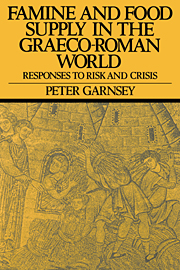Book contents
- Frontmatter
- Contents
- List of tables and figures
- Preface
- Abbreviations
- Maps
- PART I THE INCIDENCE AND SEVERITY OF FOOD CRISIS
- PART II SURVIVAL STRATEGIES
- PART III FOOD SUPPLY AND FOOD CRISIS IN ATHENS C. 600–322 BC
- 6 The resources of Attica
- 7 The beginnings of dependence
- 8 Rulers of the sea
- 9 Vulnerability and vigilance
- 10 From uncertainty to crisis
- PART IV FOOD SUPPLY AND FOOD CRISIS IN ROME C. 509 BC – AD 250
- CONCLUSION
- Bibliography
- Index
10 - From uncertainty to crisis
Published online by Cambridge University Press: 12 November 2009
- Frontmatter
- Contents
- List of tables and figures
- Preface
- Abbreviations
- Maps
- PART I THE INCIDENCE AND SEVERITY OF FOOD CRISIS
- PART II SURVIVAL STRATEGIES
- PART III FOOD SUPPLY AND FOOD CRISIS IN ATHENS C. 600–322 BC
- 6 The resources of Attica
- 7 The beginnings of dependence
- 8 Rulers of the sea
- 9 Vulnerability and vigilance
- 10 From uncertainty to crisis
- PART IV FOOD SUPPLY AND FOOD CRISIS IN ROME C. 509 BC – AD 250
- CONCLUSION
- Bibliography
- Index
Summary
After the battle of Chaeronea in 338, the external food supply of the Athenians was as much in the hands of others as it had been at the beginning of the century. It is difficult to believe that grain flowed as freely from the north, given the demonstrably increased vulnerability of the Athenians to food crisis in this period. It is noteworthy that imports from the west and south-east come into prominence in the sources only after Chaeronea.
The Athenians did little to endear themselves to the rulers of Macedonia. Philip's seizure of the grain ships in 340 was repeated at some point in the following decade. The speaker of On the Treaty with Alexander, delivered in 331, complains:
For they have grown so arrogant that they forced all the ships coming from the Black Sea to put in at Tenedos … and refused to release them until you passed a decree to man and launch 100 triremes instantly.
The grain fleets were most vulnerable when war was being waged between Macedon and Greek states, especially in 338/7 and 323/2 (the Lamian war), but also in 335/4 (the Theban war) and 331/0 (the revolt of Agis of Sparta, a limited enterprise). The Persian fleet was a force in the Aegean from 334/3 to the early summer of 332. Other states, for example, Byzantium, periodically obstructed the passage of the grain ships. Finally, piracy flourished during the period of Macedonian ascendancy.
GRAIN IMPORTS
Grain was still routinely sought in the Black Sea in the late 330s and 320s by traders serving Athens.
- Type
- Chapter
- Information
- Famine and Food Supply in the Graeco-Roman WorldResponses to Risk and Crisis, pp. 150 - 164Publisher: Cambridge University PressPrint publication year: 1988



